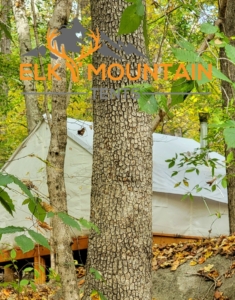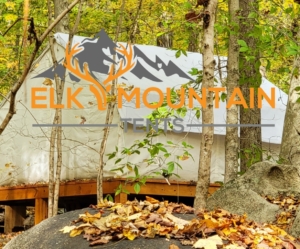Polyester Materials in Canvas Tents
In the world of camping, the materials used to construct tents have come a long way in recent years. Science has improved the tent materials we are able to use today, making them stronger, more durable and more weather-resistant than ever before. One such material that has proven to be a game-changer in the tent industry is polyester. Here are a few reasons why polyester tents, like those used by Elk Mountain Tents, are better than traditional cotton canvas tents.

Polyster and Weatherability
First, polyester tents are more weather-resistant than cotton canvas tents. Polyester is a synthetic fabric that is naturally water-proof, whereas cotton is a natural fabric that absorbs water. This means that a polyester tent will hold up better in wet conditions and will keep you dryer than a cotton canvas tent. Additionally, polyester tents are also more resistant to mildew and mold, which can be a major concern in humid or damp environments. Being a synthetic fabric there’s nothing there for bugs and micro creatures to enjoy.
Polyester and Breathability
Some have worried that the natural water-proof nature of polyester might cause it to have issues with condensation. However, that is not necessarily the case. Polyester canvas can be just as breathable as cotton canvas depending on how it is manufactured.
Polyester and Durability
Second, polyester tents are more durable than cotton canvas tents. Polyester is a strong and durable fabric that can withstand wear and tear better than cotton. This means that a polyester tent will last longer and be less likely to tear or rip than a cotton canvas tent. Additionally, polyester tents are also more resistant to UV rays, which can cause cotton canvas tents to fade or weaken over time.
The Diversity of Polyester Fabrics
There is a much greater diversity in polyester materials than there is in cotton. A “polyester tent” could be as thin as a nylon dome tent, have the texture of plastic, and have significant condensation issues, or it can just as strong and breathable as cotton canvas, so it’s important to ask the right questions:
- What is the oz weight per yard? This one number will give you a general balpark estimate for the tent’s overall strength. Cotton canvas is typically sold in 10 oz, 12 oz, and 14 oz weights, and your polyester tent should be comparable although likely a little lighter. The polyester canvas used by Elk Mountain Tents is an 11 oz canvas.
- What is the break and tear strength? The answer to this should be two different numbers, one for warp direction and one for the fill direction. Even two canvases of the same weight can have different break and tear strengths, but the data you get with this question will help you know exactly what you’re getting
- How breathable is your canvas? Most companies will say there’s is breathable so the best thing you can do is read the reviews online and pay attention to comments about condensation. At a bare minimum, make sure you get a tent with screened ridge openings and preferably also screened windows as this can remedy most condensation issues.
- Can I have a sample of your canvas? There’s something to be said for the actual experience of have having it your hands. Any reputable company would be willing to send a sample of their canvas.
Polyester and Weight
Third, polyester tents are more lightweight and easier to pack than cotton canvas tents. Now, let’s be real for a second – any canvas material is bulky and not ideal for backpacking, but polyester canvas will be about 20% lighter and significantly stronger. This means that a polyester tent will be less cumbersome and easier to set up and take down than a cotton canvas tent.

Polyester and Affordability
Fourth, polyester tents are more affordable than cotton canvas tents. Cotton canvas tents are made of natural cotton fibers, which makes them more expensive to produce than polyester tents. This means that a polyester tent will be less expensive than a cotton canvas tent, making it more accessible for many people.
Cotton and Polyester Blend Tents
The aim with a cotton-poly blend tent is threefold. First, the more polyester you add to a tent the more water- and mold-resistant it becomes. Second, polyester is stronger than cotton, so the more polyester in the canvas the stronger it will be for its weight. Related to this point, it will also make your tent slightly lighter. Third, many hope that by having half of the fibers be made of cotton they will be able to improve the breathability. And it does! However, that’s not to say that a blend tent is more breathable than a poleyster tent since the way the fibers are assembled in the manufacturing process also affects breathability.
The downsides of a cotton-poly blend tent are the same as those of a 100% cotton tent. The more organic fibers you introduce the more you need to be concerned about UV damage and mold rotting away your tent.
Conclusion: Polyester for the Win
In conclusion, polyester tents, like those used by Elk Mountain Tents, are better than traditional cotton canvas tents. They are more weather-resistant, more durable, more lightweight, and more affordable. We should use the science of today to improve the products we use, and polyester is a prime example of this. Campers today have the opportunity to enjoy a better camping experience because of the advancements in tent materials. If you’re looking for a high-quality tent that will last for years to come, consider a polyester canvas tent from Elk Mountain Tents.


